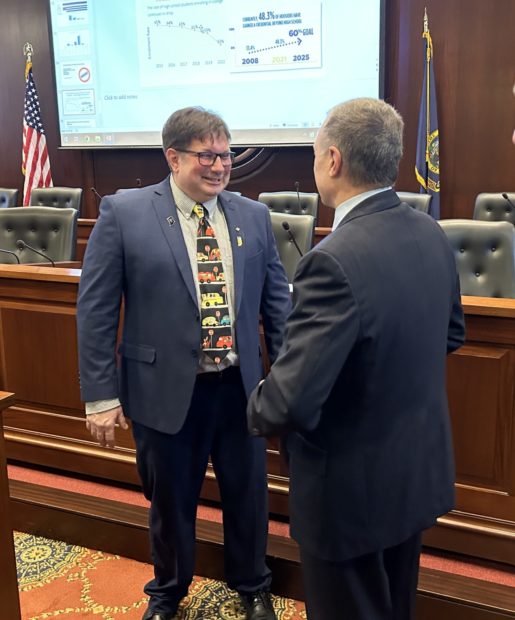The Idaho Business for Education’s guest speaker from rural Indiana schools outlined a destructive financial picture if school vouchers are implemented in Idaho.
More than 100 people attended the early morning session, held in the Statehouse’s largest committee meeting room, the Lincoln Auditorium. Attendees included state superintendent Debbie Critchfield and her chief of staff, Greg Wilson; State Board of Education member Cally Roach; representatives of the Idaho School Boards Association and the Idaho Association of School Administrators; Boise school trustee Dave Wagers; and a host of legislators, including numerous House and Senate education committee members.
Based on his research as the executive director of the Indiana Rural and Small Schools Association, Chris Lagoni said vouchers do not serve the interests of rural communities. Lagoni was asked by IBE to give Idahoans a preview of what could happen to rural school districts if Idaho lawmakers approve vouchers, or a vehicle to shift public dollars into private schools. Efforts to promote school choice are expected to dominate the 2023 legislative session.

IBE’s CEO Rod Gramer is an outspoken opponent to school choice.
Vouchers in Indiana were planned as a way for students to escape failing schools, Lagoni said. But that “has not really panned out.”
When asked about winners and losers, he said both rural and urban schools experienced a loss of funding per student.
“I think the biggest winner has been the archdiocese. They’re the greatest consumer of vouchers and, yeah, they’ve been the best customer,” he explained.
Idaho has 119 private schools (most are parochial) and more than 730 public schools. About 14,500 students attend private schools and about 312,000 attend public schools.
Lagoni is an assistant professor of Education at Wesleyan University in Indiana and represents 100 school districts as director of the Small Schools Association. He’s served as a classroom teacher, vice principal and school superintendent.
Lagoni’s systematic presentation and supporting data focused on five conservative ideals: fiscal responsibility, reducing the size of government, tax cuts, accountability and transparency. On each point, he presented graphs and statistics demonstrating how vouchers undermined each one.
For example, vouchers create a lack of fiscal responsibility, he noted:
- Choice increases the cost of education by spending general fund dollars on three schools systems — private, religious and public.
- There is no oversight on how tax dollars are being used once they pass to private and religious schools.
- It is not fiscally responsible for the state to directly subsidize private enterprises.
- Private and religious schools are private enterprises — some are even for-profit private schools. (Idaho has five for-profit private schools and the rest are non-profit.)
Another important point mentioned, which is at the forefront of this legislative session, is property taxes.
As a voucher state, Indiana’s choice program and lower per student funding has led to higher property taxes:
- With less state support, public schools have had to go to voters to make up the difference.
- Declining populations paired with a strong desire to keep their local schools open and thriving has meant some communities are voting to raise their taxes.
“This hits mainstream businesses and homeowners hard,” Lagoni said.
Before Indiana’s reform in 2011, there were very few supplemental levy requests. But that’s changed. “It’s happening more and more,” he said.
“Some communities are voting to raise your taxes and some are not. And then that’s putting more pressure on the schools to figure out how they’re going to survive,” he said.
With the possibility of “universal vouchers” — an expansion of who can qualify — in Indiana, Lagoni doesn’t see the program slowing down; in fact, he described it as an ever-expanding bureaucracy.
